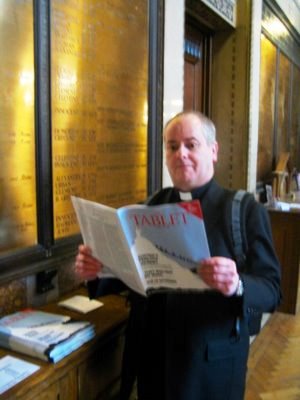By
Michael GaynorBy visiting Pope Benedict and then issuing the public statement she issued after the meeting, Pelosi has made it imperative for her bishop to begin excommunication proceedings against her and distributors of Holy communion to refuse her under canon law, to avoid sin themselves.The title of that Catholic News Service (CNA) article on their meeting is "Pope Benedict strongly rebukes Pelosi over abortion," but it may as well have been "Pope Prepares for Pelosi Ex-communication, if She Won't Repent."
Speaker of the House Nancy Pelosi regularly claims to be an ardent Catholic while ardently supporting abortion. She has supported even taxpayer funded abortions and opposed a partial-birth abortion ban.
CNA highlighted that Pelosi was rebuked for her abortion advocacy and denied a photo-op by his Holiness, Pope Benedict XVI:
"House speaker Nancy Pelosi's photo-op with Pope Benedict XVI turned sour when the Pontiff used the 15-minute meeting to reaffirm the teachings of the Catholic Church on the right to life and the duty to protect the unborn.
"No photo of Nancy Pelosi and the Pope will be forthcoming, since the meeting was closed to reporters and photographers. The two met in a small room in the Vatican just after the Pope's weekly public audience."
Immediately after the meeting, the Vatican press office released this statement:
"Following the general audience the Holy Father briefly greeted Nancy Pelosi, Speaker of the United States House of Representatives, together with her entourage."His Holiness took the opportunity to speak of the requirements of the natural moral law and the Church's consistent teaching on the dignity of human life from conception to natural death which enjoin all Catholics, and especially legislators, jurists and those responsible for the common good of society, to work in co-operation with all men and women of good will in creating a just system of laws capable of protecting human life at all stages of its development."
Pelosi should humbly heed the words of Pope Benedict that she heard and repent.
If not, Pope Benedict paved the way for her excommunication.
Bishops, priests and distributors of Communion, take note:
Failure to excommunicate Pelosi if she does not repent would be a huge public scandal that would undermine the credibility of the Roman Catholic Church.
Giving Pelosi Holy Communion if she does not repent would be a sacrilege as well as a public scandal that would undermine the credibility of the Roman Catholic Church.
The day before the Speaker met the Pope, Jon O'Brien, president of "Catholics for Choice," told
The Hill that their meeting would be an opportunity to highlight that one can be pro-choice and Catholic, and that there are much bigger issues out there to discuss, such as the fate of the poor in the global economic downturn.
That is patent nonsense and the fact that the Pope spent his time talking with Pelosi on the right to life and the need to defend the unborn demonstrates it.
Last year Pelosi said on "Meet The Press": "I would say that as an ardent, practicing Catholic, [when life begins] is an issue that I have studied for a long time. And what I know is over the centuries, the doctors of the church have not been able to make that definition ... St. Augustine said at three months. We don't know. The point is, is that it shouldn't have an impact on the woman's right to choose."
Pope Benedict personally explained to Pelosi that life begins at conception.
Previously the United States Conference of Catholic Bishops had issued a public statement correcting Speaker Pelosi and stating: "Since the first century the church has affirmed the moral evil of every procured abortion. This teaching has not changed and remains unchangeable. Direct abortion, that is to say, abortion willed either as an end or a means, is gravely contrary to the moral law."
Pelosi's office eventually released a statement on her papal visit that completely ignored life issues.
Pelosi said in her statement:
"It is with great joy that my husband, Paul, and I met with his Holiness, today. In our conversation, I had the opportunity to praise the Church's leadership in fighting poverty, hunger, and global warming, as well as the Holy Father's' dedication to religious freedom and his upcoming trip and message to Israel.
"I was proud to show his Holiness a photograph of my family's Papal visit in the 1950s, as well as a recent picture of our children and grandchildren."
George Weigel, a distinguished senior fellow of Washington's Ethics and Public Policy Center, cleverly titled his article on the meeting "Were They at the Same Meeting?" and deemed Pelosi both shameless and confused.
Mr. Weigel:
"Charity requires that one concede the possibility that genuine piety was a part of Pelosi's (rather boorish, and certainly irregular) insistence on being given a private moment with the pope during her current taxpayer-funded junket to Rome. But her office's statement on today's meeting makes it clear something else was afoot: that Pelosi, who shamelessly trumpets her 'ardent' Catholicism while leading congressional Democrats in a continuing assault on what the Catholic Church regards as the inalienable human rights of the unborn, was trying to recruit Benedict XVI ('Joseph Ratzinger, D., Bavaria'?) to Team Nancy.
"His Holiness wasn't buying it.
"He told Pelosi, politely but unmistakably, that her relentlessly pro-abortion politics put her in serious difficulties as a Catholic, which was his obligation as a pastor. He also underscored — for Pelosi, Joe Biden, Ted Kennedy, John Kerry, Barbara Mikulski, Rose DeLauro, Kathleen Sebelius, and everyone else — that the Church's opposition to the taking of innocent human life, at any stage of the human journey, is not some weird Catholic hocus-pocus; it's a first principle of justice than can be known by reason. It is a 'requirement of the natural moral law' — that is, the moral truths we can know by thinking about what is right and what is wrong — to defend the inviolability of innocent human life. You don't have to believe in papal primacy to know that; you don't have do believe in seven sacraments, or the episcopal structure of the Church, or the divinity of Christ, to know that. You don't even have to believe in God to know that. You only have to be a morally serious human being, willing to work through a moral argument — which, of course, means being the kind of person who understands that moral truth cannot be reduced to questions of feminist political correctness or partisan political advantage."
Amen!
Mr. Weigel opined that "Pelosi is deeply confused about what her church teaches on the morality of abortion, and why" and speculated that Pelosi "may have come to her bizarre views on her own." but "it's far more likely that she has been un-catechized, so to speak, by Catholic intellectuals and clerics who find Catholic teaching on life issues an embarrassment among their high-minded friends and colleagues of the progressive persuasion."
Mr. Weigel certainly was charitable, and may be right, that Pelosi actually is "deeply confused." But history shows that Democrat politicians with national aspirations like former 1980 Democrat presidential hopeful and still Senator Ted Kennedy, former Senator now Vice President Joe Biden, 2004 Democrat presidential candidate and Senator John Kerry and Pelosi adopted a pro-abortion view that has served their political interests instead of being faithful to fundamental Catholic teaching, confusion is the most charitable explanation and rank political opportunism seems to be a more plausible explanation in at least some cases.
Be that as it may, it is wonderful that Pelosi met with Pope Benedict, because now there is absolutely no question that she has been admonished by the Roman Catholic Church's highest authority that she has separated herself from what she still claims to be her Roman Catholic faith.
Mr. Weigel:
"Whatever the source of her confusion, Pelosi has now been informed, and by a world-class intellectual who happens to be the universal pastor of the Catholic Church, that she is, in fact, confused, and that both her spiritual life and her public service are in jeopardy because of that.
"Moreover, it is reasonable to assume that Pope Benedict did not have only Pelosi in mind when he said what he had to say about the obligations of moral reason and the duties of statesmanship. President Obama is not a Catholic, but he should understand that he will get the same message if, as expected, he meets with His Holiness later this year."
It is noteworthy that contrary to normal protocols for such meetings with dignitaries, no photos of Pelosi with the Pope have been released and that, diplomatic language notwithstanding, Pope Benedict firmly rebuked Pelosi.
Vatican correspondent John Allen, who writes for
National Catholic Reporter, noted that "routine Vatican declarations after diplomatic meetings also generally sum up the range of issues discussed rather than concentrating on a particular point. In that sense, the statement can only be read as a rejection of Pelosi's statements last summer, and, in general, of her argument that it's acceptable for Catholics in public life to take a pro-choice position."
Exactly!
By visiting Pope Benedict and then issuing the public statement she issued after the meeting, Pelosi has made it imperative for her bishop to begin excommunication proceedings against her and distributors of Holy communion to refuse her under canon law, to avoid sin themselves.
Finally, given the widespread misreporting and confusion in the American media on Mrs. Pelosi's audience with the Holy Father, here are some helpful facts from a learned priest:
1) The Holy Father receives in formal audience — apart from hierarchs and member of the diplomatic corps — only heads of state and heads of government. (E.g. Queen Elizabeth II is received as head of state, and wears black with court jewels — Catholic queens regnant or consort wear white with Papal decorations; male monarchs and royal consorts wear court dress and decorations. Mr. Brown as PM would be received less formally as head of government.) These audiences are in the Apostolic Palace. The Pope wears a red mantaletta trimmed with fur in audience with a head of state — red satin in summer, red velvet in winter trimmed with ermine, and white silk trimme with ermine in Paschal tide, on top of a rochet, and wering the Papal stole embroidered with figures of SS. Peter and Paul — and meets the visting head of state (who has been greeted at in the Damacen court by the Master of the Papal Household and other domestic prelates and chamberlains) at the lintel of his private apartments.
(As Prince of Princes, the Pontiff receives no one, except a Patriarch, at the front entrance to his residence as heads of state normally greet each other; notable exceptions to this have been Constantine in 800 and President Bush last year, when the Pope met him at the door to the Tower of the Winds. This was an historic gesture and one which stunned Europeans although our media in its ignorance had no grasp of its significance. But President Bush was informed ahead of time by the Vatican that the Pope would do this and he thanked the Pope for this "historic honor." In Bush's instance, the Pope was clearly making a sign of his special regard for him.)
Often, as a courtesy, the Pontiff will receive in the Apostolic Palace the spouse of a head of state or government without the above protocols. In every instance, the Pope does not appear until the visitor has arrived, since no one may be late for a Papal audience. Pope Pius XII once received Eva Peron as a gesture to the Argentinian people (the Argentinian government had given a large donation for the new main building of the Gregorian University.) She was 20 minutes late, so the Papal chamberlains kept her waiting 21 minutes before the Pope received her, and she was given a minor decoration instead of a customary higher order.
Mrs. Pelosi has no protocol rank equivalent to the above. In all papal ceremonies, monarchs take precedence over elected heads of state (eg. the President of the United States would sit behind the king of Tonga or the Archduke of Luxembourg).
2) Mrs. Pelosi was given the lowest ranking audience possible: a "baciamano" — which is granted to thousands of people, usually after they have been standing behind a barrier. It lasts only a few minutes and was not in the state reception rooms. She and her small group were lined up with various civil figures and representatives of lay groups and pilgrimage party and had to wait her turn after the general audience (attended by thousands of people in the Paul VI Audience Hall).
3) The Pope made the unusual gesture of giving a brief talk to her and her entourage on the right to life, which by its exceptional nature was an instruction and admonition.
4) This Pope rarely invites anyone to his private Mass. Mrs. Pelosi was not invited and she certainly did not receive communion from the Pope.
5) Contrary to some hysterical reports, she was given no award. She was not even given a papal decoration or gift, which is interpreted as a sign of disapproval. She may have been given a rosary, but everyone who speaks to a Pope is given one (children, the infirm, etc.).
6) The Vatican issued a statement making clear that Mrs. Pelosi was given an admonition. Rarely does this happen at a baciamano.


![[Crucifixion-sm1.jpeg]](https://blogger.googleusercontent.com/img/b/R29vZ2xl/AVvXsEj8lP8IKOTZwi0MG_Nl-tDNtStcTNqHt2kvZ8uX1TggfrGF01M223H-Hg1A9H6c8Fm2hABn6xmI5fhnT2QnEG2HV6nD1gLYC07XYZMuTTZau6wAwSLi_x41FX33GybH64LAoiOojJyf3-57/s1600/Crucifixion-sm1.jpeg)


















 During a recent cordial phone chat about this sad affair, Fr. Finigan and I predicted that The Pill would come after him for responding in detail.
During a recent cordial phone chat about this sad affair, Fr. Finigan and I predicted that The Pill would come after him for responding in detail.















